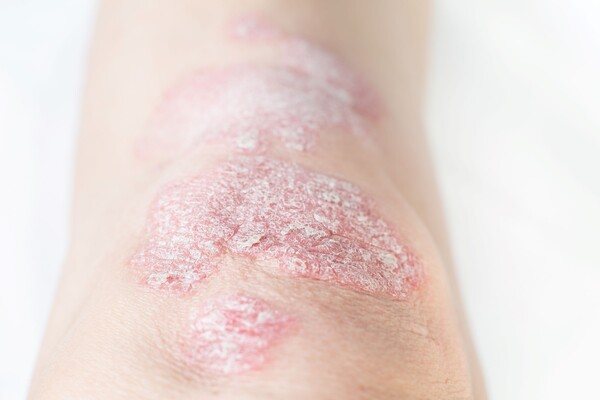Psoriasis is a chronic immune disorder in which the skin's immune cells interact incorrectly, resulting in overactive T-cells and thick, flaky skin.

Despite being well controlled, psoriasis can worsen if patients lower their guard. Its aggravation can be caused by discontinuing or by various external factors. So, it is important to maintain good psoriasis management habits.
Dr. Jo Seong-jin, a professor of dermatology at Seoul National University Hospital, has offered some advice.
● Moisturize your skin: Dry skin aggravates psoriasis, so it is important to apply moisturizer daily. Since psoriasis tends to flare up in the winter and improve in the summer, applying moisturizer more thoroughly during the winter months and maintaining proper indoor humidity to avoid dryness is helpful.
Practicing good bathing habits is also important, as prolonged or frequent baths can dry out the skin and make psoriasis worse.
● Avoid unnecessary irritation: Psoriasis tends to flare up when the skin is injured or constantly irritated. Therefore, avoiding unnecessary irritation, such as forceful exfoliation, picking, or scratching, and avoiding tight clothing and jewelry is best.
You should also avoid overexertion, which can lead to injury; if you can't, make sure to wear protective gear.
● Stress management: Psoriasis is very closely related to mental stress. Stress affects various hormones and autonomic neurotransmitters, disrupting the body's balance. Many people with psoriasis experience new flare-ups or exacerbations of the disease after severe stress.
Therefore, finding your way to manage stress can be useful for managing psoriasis. Meditation and yoga can be helpful, and reducing stress through hobbies or exercise that you enjoy can also help you manage your psoriasis. Getting enough sleep and maintaining a routine are also very important.
● Don't smoke or drink: Smokers have about up to two times the risk of psoriasis as nonsmokers, and their symptoms tend to be more severe. In addition, psoriasis treatments may be less effective in patients who smoke.
Also, avoid excessive alcohol consumption as it can interfere with the immune system and increase the side effects of psoriasis medications.
● Obesity management: Psoriasis is more likely to be accompanied by metabolic syndrome, including hypertension, diabetes, dyslipidemia, and obesity. Obese patients have more severe psoriasis lesions, and their medications are less effective. On the other hand, correcting obesity improves the response to medications.
Maintaining an appropriate body weight and muscle mass through regular exercise and diet can help control psoriasis. While no specific foods have been proven to be effective in treating psoriasis, the basic principle of a good diet is to eat a balanced diet with adequate calories on a regular basis.
"As with any chronic disease, managing psoriasis well requires consistency and persistence," Professor Jo said. "Along with proper treatment, we recommend maintaining good lifestyle habits, such as eating a regular diet, managing stress, not smoking, and exercising."

